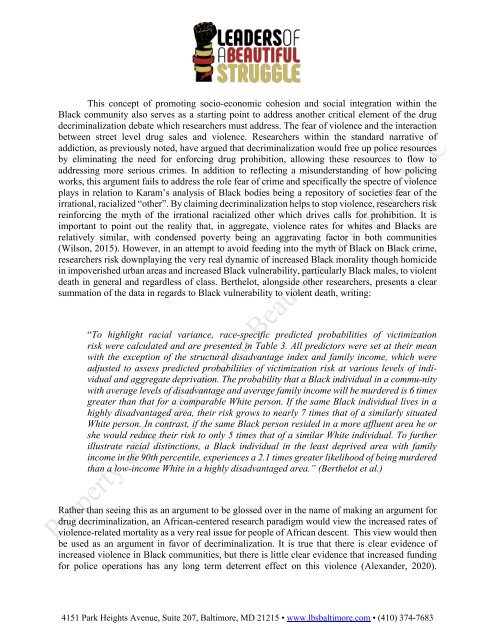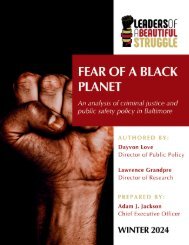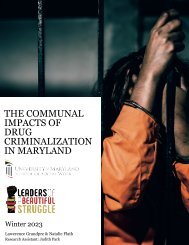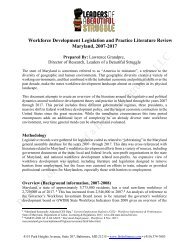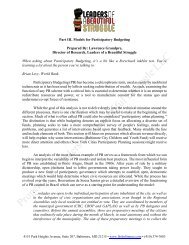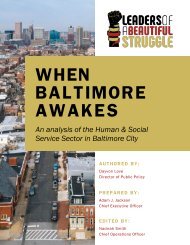Drug Decriminalization in Maryland Through an African Centered Research Paradigm- Analysis and Recommendations
This document offers guidance for theorizing questions related to a proposed research project purposed to advance drug decriminalization in Maryland.
This document offers guidance for theorizing questions related to a proposed research project purposed to advance drug decriminalization in Maryland.
- No tags were found...
You also want an ePaper? Increase the reach of your titles
YUMPU automatically turns print PDFs into web optimized ePapers that Google loves.
This concept of promot<strong>in</strong>g socio-economic cohesion <strong>an</strong>d social <strong>in</strong>tegration with<strong>in</strong> the<br />
Black community also serves as a start<strong>in</strong>g po<strong>in</strong>t to address <strong>an</strong>other critical element of the drug<br />
decrim<strong>in</strong>alization debate which researchers must address. The fear of violence <strong>an</strong>d the <strong>in</strong>teraction<br />
between street level drug sales <strong>an</strong>d violence. <strong>Research</strong>ers with<strong>in</strong> the st<strong>an</strong>dard narrative of<br />
addiction, as previously noted, have argued that decrim<strong>in</strong>alization would free up police resources<br />
by elim<strong>in</strong>at<strong>in</strong>g the need for enforc<strong>in</strong>g drug prohibition, allow<strong>in</strong>g these resources to flow to<br />
address<strong>in</strong>g more serious crimes. In addition to reflect<strong>in</strong>g a misunderst<strong>an</strong>d<strong>in</strong>g of how polic<strong>in</strong>g<br />
works, this argument fails to address the role fear of crime <strong>an</strong>d specifically the spectre of violence<br />
plays <strong>in</strong> relation to Karam’s <strong>an</strong>alysis of Black bodies be<strong>in</strong>g a repository of societies fear of the<br />
irrational, racialized “other”. By claim<strong>in</strong>g decrim<strong>in</strong>alization helps to stop violence, researchers risk<br />
re<strong>in</strong>forc<strong>in</strong>g the myth of the irrational racialized other which drives calls for prohibition. It is<br />
import<strong>an</strong>t to po<strong>in</strong>t out the reality that, <strong>in</strong> aggregate, violence rates for whites <strong>an</strong>d Blacks are<br />
relatively similar, with condensed poverty be<strong>in</strong>g <strong>an</strong> aggravat<strong>in</strong>g factor <strong>in</strong> both communities<br />
(Wilson, 2015). However, <strong>in</strong> <strong>an</strong> attempt to avoid feed<strong>in</strong>g <strong>in</strong>to the myth of Black on Black crime,<br />
researchers risk downplay<strong>in</strong>g the very real dynamic of <strong>in</strong>creased Black morality though homicide<br />
<strong>in</strong> impoverished urb<strong>an</strong> areas <strong>an</strong>d <strong>in</strong>creased Black vulnerability, particularly Black males, to violent<br />
death <strong>in</strong> general <strong>an</strong>d regardless of class. Berthelot, alongside other researchers, presents a clear<br />
summation of the data <strong>in</strong> regards to Black vulnerability to violent death, writ<strong>in</strong>g:<br />
“To highlight racial vari<strong>an</strong>ce, race-specific predicted probabilities of victimization<br />
risk were calculated <strong>an</strong>d are presented <strong>in</strong> Table 3. All predictors were set at their me<strong>an</strong><br />
with the exception of the structural disadv<strong>an</strong>tage <strong>in</strong>dex <strong>an</strong>d family <strong>in</strong>come, which were<br />
adjusted to assess predicted probabilities of victimization risk at various levels of <strong>in</strong>dividual<br />
<strong>an</strong>d aggregate deprivation. The probability that a Black <strong>in</strong>dividual <strong>in</strong> a commu-nity<br />
with average levels of disadv<strong>an</strong>tage <strong>an</strong>d average family <strong>in</strong>come will be murdered is 6 times<br />
greater th<strong>an</strong> that for a comparable White person. If the same Black <strong>in</strong>dividual lives <strong>in</strong> a<br />
highly disadv<strong>an</strong>taged area, their risk grows to nearly 7 times that of a similarly situated<br />
White person. In contrast, if the same Black person resided <strong>in</strong> a more affluent area he or<br />
she would reduce their risk to only 5 times that of a similar White <strong>in</strong>dividual. To further<br />
illustrate racial dist<strong>in</strong>ctions, a Black <strong>in</strong>dividual <strong>in</strong> the least deprived area with family<br />
<strong>in</strong>come <strong>in</strong> the 90th percentile, experiences a 2.1 times greater likelihood of be<strong>in</strong>g murdered<br />
th<strong>an</strong> a low-<strong>in</strong>come White <strong>in</strong> a highly disadv<strong>an</strong>taged area.” (Berthelot et al.)<br />
Rather th<strong>an</strong> see<strong>in</strong>g this as <strong>an</strong> argument to be glossed over <strong>in</strong> the name of mak<strong>in</strong>g <strong>an</strong> argument for<br />
drug decrim<strong>in</strong>alization, <strong>an</strong> Afric<strong>an</strong>-centered research paradigm would view the <strong>in</strong>creased rates of<br />
violence-related mortality as a very real issue for people of Afric<strong>an</strong> descent. This view would then<br />
be used as <strong>an</strong> argument <strong>in</strong> favor of decrim<strong>in</strong>alization. It is true that there is clear evidence of<br />
<strong>in</strong>creased violence <strong>in</strong> Black communities, but there is little clear evidence that <strong>in</strong>creased fund<strong>in</strong>g<br />
for police operations has <strong>an</strong>y long term deterrent effect on this violence (Alex<strong>an</strong>der, 2020).<br />
4151 Park Heights Avenue, Suite 207, Baltimore, MD 21215 • www.lbsbaltimore.com • (410) 374-7683


